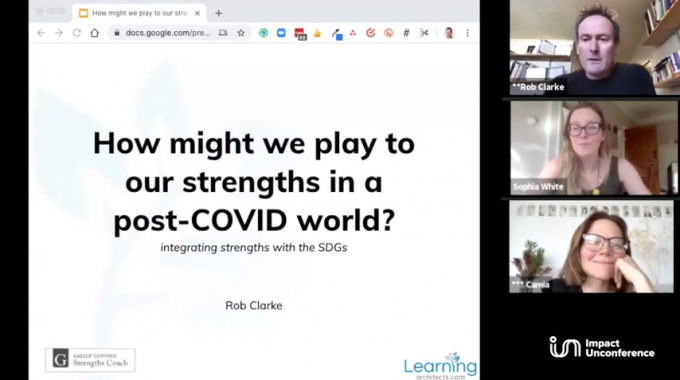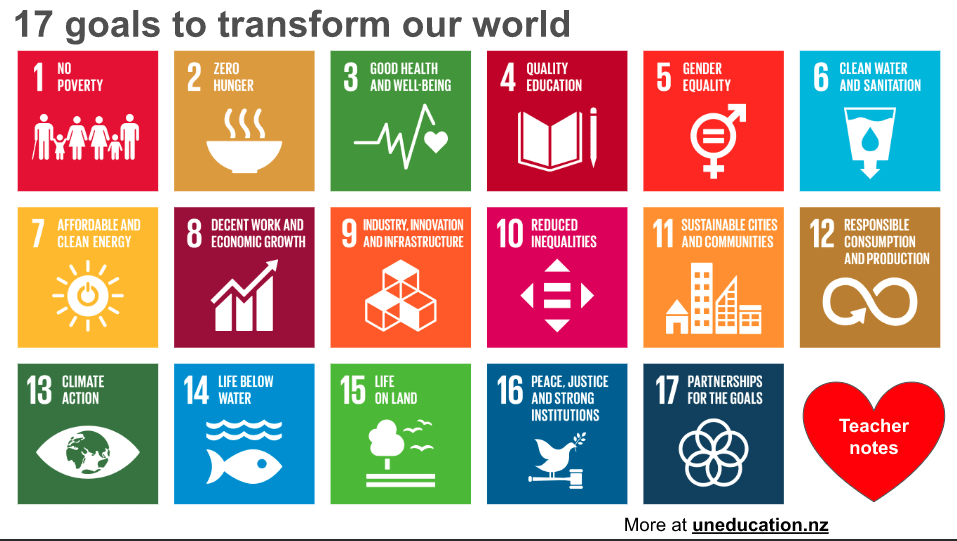Playing to our strengths in a post-COVID world

Collaborate in order to build our future
During lockdown, I had the opportunity to present at New Zealand’s first virtual Impact Unconference. With an overall theme of ‘collaboration’, it aimed to help participants generate ways to collaborate in order to build our future post Covid-19 so everyone can thrive. This was the first time the event had been run in New Zealand and I found it to be organised in a really interesting and inclusive way.
The unique thing about an unconference is that the participants hold the reins in terms of what is presented. Anyone who was interested in presenting at the conference firstly had to submit their topic to the group for others to vote on – and you would only know the day before the event whether or not you had been selected. This approach meant the programme included a real diversity of topics and ensured that there was something for everybody, whatever their area of interest.
Given the situation at the time (pre-lockdown, the conference was originally going to be held ‘on the ground’), the organisers were particularly interested in exploring the foundations we can build on in a post-crisis world.
The would-be presenters came from many different sectors and walks of life, including NFPs, charities, private business, consultants, coaches and educators, and I thought the way the organisers helped us navigate the process beforehand was very clever. Firstly, we had to attend a quick Zoom meeting where we used Miro (an online brainstorming tool) to share our ideas.
Big ideas
All the ideas were then grouped into similar themes and then further organised into these broad themes:
- Reducing carbon
- Cities & citizens
- Funding
- Circular economy & design
- Economic
- Curiosity & peacemaking
- Storytelling
- Learning & education
- Government engagement
- Diversity
- Self-awareness
- Working & mindset
Once that was done, (here’s a link to the Miro brainstorm) each presenter had to list their topic in a Google Form which was then sent out to all attendees, so that they could vote on the topics they wished to see presented the next day.
Because I have a keen personal interest in the UN’s Sustainable Development Goals and the impact they can have on the world, I chose a topic that was aimed at helping participants identify their own strengths and areas of interests within the SDG framework, exploring how they might get these to align, and then considering what actions they could take to help manifest these goals.
As a korero starter, my question was: “How might we play to our strengths in a post-COVID world?”
This question brought together two large bodies of work that are passions of mine: the use of Strengths as an approach to leadership (and life) that enables people to thrive by focussing on what they are naturally good at (their strengths) along with my voluntary work for the United Nations Association of NZ, where we help Kiwis understand and better support the work of the United Nations, including the Sustainable Development Goals.
Around 300 people from all over NZ attended, and the introductory keynote speaker, and one of the hosts, Stephen Moe, stepped us through how it worked, introduced the key team and set the scene for the overall theme: collaboration.
Each ‘korero starter’ (presentation/conversation starter) was 30 minutes long. On the morning of the unconference, presenters met with the tech support team to check that we were okay to use Zoom and to see how we could be supported during our session. Every presenter was allocated a Google Doc for participants to use to compile collaborative notes and I was really pleased with the ideas and engagement that the people attending my session came up with.
Half an hour was a very short time to present two big ideas and it certainly made me crystalise my thinking beforehand! I decided to give people a very quick overview of both the United Nations Sustainable Development Goals (SDGs) and the Strengths movement, before asking participants to identify examples of their own talent, match those to an SDG they wish to make a difference in, and think about how they could take action to make an impact.
Te mea ka taka te kākano ki te wāhi e tika ana ka tinaku, ā, ka pihi ake he tipu hou.
If a seed falls in the right place it will germinate and a new seedling will sprout.
Examples of actions that people chose
Some examples of actions that people chose included:
- Using my advocacy skills to support local communities and building robustness in its members, which aligns with SDG3 ‘Good health and wellbeing’ and SDG11 ‘Sustainable cities and communities’.
- Using my strengths of empathy, future focus and being positive to improve SDG17 Partnerships by helping us transition from crisis to recovery and regeneration.
- Using SDG3 Good health and wellbeing to advocate for the use of the arts to benefit the social and mental wellbeing of the community.
- Create a new enterprise focused on SDG14 – Life under the water. I am obsessed with seaweed, and want to open a seaweed farm attached to a marine reserve, volunteering for ReGenSea
If you want a little inspiration or to see precisely how it worked here is the video of my presentation.
Combining two powerful frameworks
Something that I particularly enjoyed about this session was the enthusiasm people showed for applying their strengths to a particular situation or situations… looking to focus on their natural talent and use this within the framework of the UN Sustainable Development Goals to support our recovery from the COVID crisis.
As a leadership coach, the one key defining feature of people who make the most of their coaching input is taking action on new insights. When you are able to apply new thinking about how you interact with others, or lead, or solve problems (for instance), then you are able to learn new behaviours and approaches that enable you to improve. You are turning ideas into action and improving.
What could you do to make an impact using this approach?
Taking this approach with the UN Sustainable Development Goals is relatively easy; all you need to do is to identify which SDGs are relevant and useful to the context you are in, then apply the notion of taking action to that. Here are some examples:
- A business owner identifying that SDG13 Climate Action is important to act on and taking steps to minimise travel or carbon emissions, then building this into their annual planning and reporting processes.
- A school teacher helping students identify which SDGs are important in their local area, then creating projects to help students (and others) take action towards improving as an aspect of that SDG.
- A school leader taking the SDG framework and using this to inform their school curriculum design, so that when working on improving local curriculum design they take into account local priorities and match these with global issues.

Thinking in this broader, more intentional context will enable us to better utilise our strengths while applying our home-grown solutions in a post-COVID world; in other words, it is enabling us to think globally while creating innovative solutions locally, and it certainly feels like that’s what’s needed in a post-COVID world. What actually transpires of course, only time will tell, but to be taking this two-pronged approach can only make a positive impact regardless.
So, what strengths can you combine and apply at home, and/or at work, to make a difference in our post-COVID world?

Facebook Comments